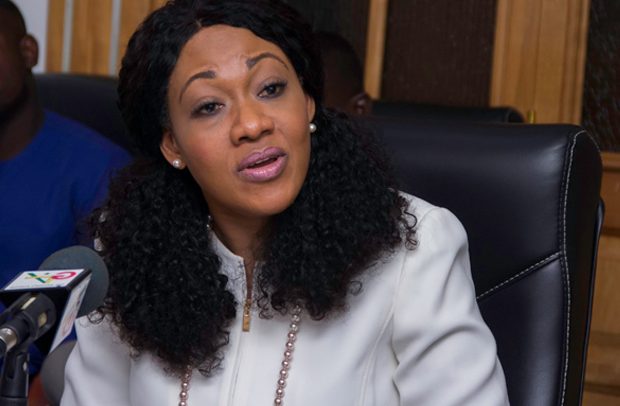Jean Mensa – EC Chairperson
The Electoral Commission (EC) reduced the cost of election during the 2020 polls by an unprecedented 41% compared to the 2016 exercise, the effects of inflation and appreciated costs notwithstanding.
In her speech during the maiden assessment of the 2020 polls with the Inter-Party Advisory Committee (IPAC) last Tuesday in Accra, the Chairperson of the EC, Ms. Jean Mensa said “as a country, we reduced the cost of elections from thirteen dollars ($13) per person to seven dollars, seventy cent ($7.7) per person. It is not often we hear of such news and we need to record how this was achieved.”
Still on the cost-saving tangent, she noted that the commission“succeeded in saving our dear nation a whopping sum of $90 million or GH¢ 522 million, a time when the cost of elections world-over keeps increasing.”
These savings were achieved in spite of additional costs associated with COVID-19 .i.e. personal protective equipment and materials and the airlifting of offshore items which came at huge costs and in spite of the fact that unlike 2016, full taxes were exacted, she explained.
In spite of feats such as replacing the existing voter identification card within a relatively short time and conducting an election in the face of a raging global pandemic, she pointed out challenges which according to her needs addressing.
Security Issues
The EC boss insisted that the commission cannot be blamed for the pockets of violence that characterised the December 7, 2020 general election, saying they were not responsible for security.
“I use this occasion to clarify that the Electoral Commission is not responsible for election security. The entire electoral process and its success rest on our shoulders, but our mandate as enshrined in the constitution does not include security.
“We need to define clearly without a shadow of a doubt whose responsibility it is to guarantee security on Election Day and to place that responsibility on their shoulders. Additionally, we need to apply the laws to ensure that the perpetrators of the violence are dealt with decisively,” she indicated.
She also appealed to the police to speed up investigations into the killings that happened in the course of the election in order for the affected to get justice, saying “I take this opportunity to call upon the Police Service and the National Elections Task Force to speed up their investigations and bring the culprits to book. The families of the victims, the citizens of Ghana, and the international community are waiting for justice to be done.”
Rejected Ballots
The volume of rejected ballots, which she described as a phenomenon, continues to hold in spite of measures put in place to stem it, saying “we have continued to witness a disturbing trend of a high number of rejected ballots. The commission spent considerable effort in designing a ballot paper to reduce the incidence of rejected ballots. We created a wide space between each candidate’s box to prevent the mark of the thumb from seeping into the next box. And yet, we still recorded three hundred and fourteen thousand, nine hundred and one rejected ballots.”
The EC, she announced, intends undertaking an audit to determine the root cause and find workable solutions to eliminate this problem.
On the issue of illegalities such as encouraging minors and foreigners to vote, she was quick to point at the efforts it has put in place to obviate the trend by working with opinion leaders and others in the communities.
Pass Mark
Ms. Jean Mensa, in spite of the challenges which she pointed out, was excited about the feats recorded by the commission, a fact acknowledged by the international community.
Such feats, she said, must be mentioned lest “they fall through the cracks of inordinate fault-finding and critique,” adding “Constructive critique is a vital part of any institutional-building and learning process, but so is celebration of success!”
She warned against the rush “to propose new recommendations when the old processes and structures are working very well. We need to be guided by the adage that ‘if it ain’t broke, don’t fix it’.”
The successes of the last polls, according to her, are worthy of celebrations, for as she put it “there is so much knowledge, good experiences and best practice residing in the Electoral Commission of Ghana.”
Proposals
The EC has proposed the closing of the polls at 3pm rather than 5pm. “In 2019, we announced our decision to close the polls at 3pm rather than 5pm, in the 2020 elections. Nonetheless, owing to the COVID-19 pandemic and the stringent, and necessarily time-consuming safety protocols we instituted at our polling stations, we were compelled to put this proposal on hold. Over the past months, however, this proposal has re-surfaced from various sections of the public, and indeed, our own experience from the 2020 elections has revealed that it is a workable proposal, as by 1pm, most polling stations were empty, suggesting that this is a workable proposal. Therefore, this is a reform we intend to put forward.”
The commission also proposed the elimination of the periodic nationwide registration exercises, and institute an all-round system where citizens who turn 18, or persons who have not previously registered, may visit any district office with their Ghana Card or passport and register as voters.
NDC Boycott
The meeting was held without the opposition National Democratic Congress (NDC), which has decided not to cooperate with the commission in the aftermath of the 2020 election.
In April, the NDC vowed not to attend IPAC meetings when it declined the EC’s invitation to one of the meetings.
According to the NDC, the current EC leadership lacked credibility.
By A.R. Gomda

